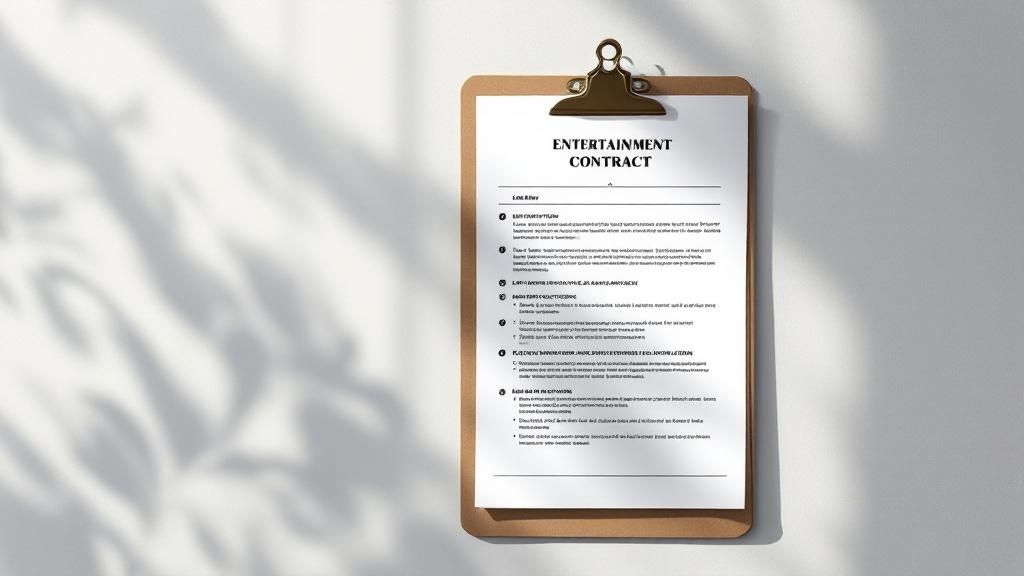Entertainment Contract Template: Secure Your Gigs & Payments
- Chase Gillmore

- Jun 9
- 13 min read
Why Handshake Deals Kill Entertainment Careers
Let's be real, the entertainment world runs on relationships. That "we're all friends here" vibe is awesome, but when it comes to contracts, it can seriously backfire. I've lost count of the horror stories I've heard from performers who relied on verbal agreements and got burned. Take it from Uptown Drive, a top-tier live band for weddings and corporate events in Texas. They've built a phenomenal reputation—240+ five-star reviews and a 9-time WeddingWire "Couples' Choice" Award—partly because clients know they're dealing with pros. A solid contract isn’t about lacking trust; it’s about establishing crystal-clear expectations right from the get-go.
Building trust through professionalism is paramount. Presenting a well-crafted entertainment contract template shows you’re serious about your business. Think about it: clients, especially corporate clients planning big events, or those searching for a reliable band for corporate events in Dallas, crave assurance. A contract screams organized, detail-oriented, and committed to a first-class experience. Plus, it protects you if anything goes sideways, giving both sides a clear path to resolve disagreements. If you're curious about what to ask clients before booking, check out our guide on booking corporate entertainment.
Entertainment contracts have always been essential, protecting everyone from artists to producers. But with the rise of digital platforms, these contracts have gone from paper to powerful digital tools. Learn more about the evolution of entertainment contracts. This shift mirrors how bands like Uptown Drive, known for their diverse setlist (everything from Motown to Top 40), adapted their approach to client communication and agreements, ultimately becoming a sought-after wedding band in Texas. Early communication is key, so make it easy for clients to Contact you.
Picture this: you book a gig with a handshake. The client promises a specific stage setup, but on the day, it's a disaster. Your meticulously planned performance, crafted with the same level of detail as Uptown Drive's genre-spanning sets, is completely thrown off. Even worse, imagine the client cancels last minute. Lost income, a gap in your schedule - it's a nightmare. A contract is your shield in these scenarios, laying out the terms and responsibilities.
Just like Uptown Drive’s commitment to their Certified Original Lineup (which ensures consistent, high-quality performances), professional contracts offer stability and peace of mind. This consistency—both in performance and business—builds trust and makes clients confident booking them for their wedding reception band in San Antonio or corporate event entertainment in Austin. Contracts show you're dedicated to exceptional service, and that translates to a strong reputation and lasting success.
The Must-Have Contract Elements That Prevent Disasters

Let's talk contracts. Not all clauses are created equal. Some are your bedrock, others… less so. Think of it like building a stage: you need a solid foundation before you can hang the lights. Here's what separates the pros from the amateurs – the non-negotiables for smooth events, whether you're a solo act or a full band like Uptown Drive.
Payment: Getting Paid What You're Worth
First things first: payment. This isn't about being difficult, it's about valuing your time and talent. Be crystal clear about your total fee, including any deposits. A standard practice is a 50% deposit upon signing, with the remaining 50% due on the day of the event. Spell out accepted payment methods (check, Venmo, PayPal, etc.) and any penalties for late payment. Trust me, this saves headaches down the road. I've seen it firsthand – clear payment terms make for happy musicians and happy clients.
Performance Details: Avoiding Day-Of Disasters
Next up: the nitty-gritty of your performance. This means date, time, location, and set length. If you offer packages (like Uptown Drive's ceremony, cocktail hour, and reception options), detail each one. Playing a corporate gig? Specify any special requests. Think award show bumper music or themed playlists. Don’t forget your technical needs: stage size, power outlets, the works. This prevents arriving at a venue only to find a postage-stamp stage and one lonely outlet. Been there, done that, learned my lesson.
Technical Requirements: The Gear That Makes it Happen
This isn't just for big bands; it’s crucial for everyone. From a solo acoustic guitarist to a full-blown wedding band, your tech needs matter. List everything: sound system, mics, lighting, power. If the venue is providing anything, state it explicitly. This protects you and ensures a smooth show. Think of it like this: your contract is your backstage pass to a stress-free performance.
Liability and Cancellation: Your Safety Net
These clauses are your insurance policy. Liability protects you if accidents happen during your performance (think someone tripping over a speaker cable). Cancellation policies outline what happens if either party cancels – including refunds and penalties. These conversations can be tricky, so a clear contract is essential. Even the best-laid plans change. I once had a gig canceled due to a hurricane – having a solid cancellation clause saved the day.
Let’s look at how these crucial elements can differ based on the type of event you're playing. It’s important to tailor your contracts to specific situations.
Essential Contract Clauses by Event Type
Contract Element | Wedding Events | Corporate Events | Private Parties | Critical Level |
|---|---|---|---|---|
Payment Terms | 50% deposit, 50% day-of | Invoice upon booking, Net 30 | Full payment day-of or pre-event | High |
Performance Details | Ceremony, Cocktail Hour, Reception specifics | Set times, special requests (e.g., award music) | Set length, specific song requests | High |
Technical Requirements | Stage size, power, sound system specs | Backline, microphone requirements, dedicated power circuits | Sound system needs, space requirements | High |
Liability & Cancellation | Clear cancellation policy, liability insurance details | Force majeure clause, detailed cancellation terms | Cancellation policy, damage waiver | High |
This table highlights the key differences and similarities between contract requirements for various event types. While the core elements remain consistent, the specifics can change dramatically depending on the context. A wedding contract, for instance, will need detailed timings for different parts of the day, whereas a corporate event might focus on specific branding requirements for the music.
By including these key elements, you're presenting yourself as a professional and protecting yourself from potential problems. A solid contract, like a great soundcheck, sets the stage for a successful performance.
Building Contract Templates That Actually Save Time

Generic entertainment contract templates? They're like trying to squeeze a whole wedding party into the same tuxedo. Not a good look. Savvy entertainers, especially those handling a range of gigs like, say, Uptown Drive, know the power of a flexible template *system*. Think of it as your personalized contract wardrobe, ready for any occasion. It's a major time-saver, and it keeps you covered legally. Speaking of legal, when you're building your templates, peeking at established legal docs can be super helpful. Check out things like Terms of Service for inspiration.
Let's say you are Uptown Drive, rocking corporate events in Austin. You wouldn't use the same contract for a small acoustic wedding ceremony as you would for a massive corporate gala with a crazy sound and light show, right? Your template system needs to handle those differences.
Structuring Your Templates for Success
So, how do you build a system that actually works?
Core Template: Start with the essentials – payment, performance details, technical needs, and those all-important liability and cancellation clauses. Think of this as your foundation.
Modular Add-ons: Create separate modules for common variations. Outdoor venue? Multi-day event? Boom, just add the appropriate module.
Clear Labeling: This is huge. A good naming system will save you headaches. "Outdoor Venue Addendum" or "Multi-Day Event Rider," for example.
This modular approach is a game-changer for many successful entertainment pros. It lets you adapt to all sorts of events and client requests without starting from scratch each time. Plus, it minimizes errors, which is great for peace of mind and legal protection.
Digital Tools and Organization: Your Secret Weapons
Juggling multiple templates can be a nightmare if you’re disorganized. Luckily, we live in a digital age! Cloud storage (Google Drive or Dropbox) makes accessing and sharing templates a breeze. Update it once, and you're good to go. By 2020, many entertainment companies were using AI-driven platforms to streamline contracts and lessen the load on their legal teams. Want to know more about this trend? Discover more insights on this trend. A well-organized system – maybe by event type (weddings, corporate, private) or by contract element (payment, technical needs) – keeps the right agreement at your fingertips. No more "oops, wrong version" moments. Just like Uptown Drive's killer Texas wedding performances, an organized system shows professionalism and builds client trust. That attention to detail, whether in music or contracts, sets the stage for smooth, successful events.
Getting Paid Without The Awkward Money Conversations

Let's be honest, talking about money can be a bit cringeworthy. But a well-crafted entertainment contract template can be your secret weapon, making sure you're paid fairly and that your clients feel confident in your professionalism. It's like having a financial advisor in your back pocket, smoothing out those potentially sticky conversations. This isn’t just about getting your paycheck; it’s about building a strong, respectful working relationship right from the start. Clear payment terms upfront prevent misunderstandings and foster trust – essential ingredients for a successful event.
Deposits & Payment Schedules: Maintaining Healthy Cash Flow
Deposits are crucial. They not only lock in your booking but also act as a safety net if a client cancels. In my experience with wedding bands here in Texas, like Uptown Drive, a 50% deposit upon signing is standard practice, with the remaining balance due on or before the event. This predictable income stream is a cornerstone of sound financial planning. But for corporate gigs, you might want to switch things up. Perhaps an upfront invoice with Net 30 terms makes more sense. The key is to tailor your payment schedule to the client and the event type to maintain a consistent cash flow.
Addressing The Tricky Stuff
Now, let's talk about those unexpected extras. Overtime? Last-minute requests? These can throw your budget off track if you're not careful. This is where your entertainment contract template really shines. Include crystal-clear language about overtime rates, specifying exactly how you'll be compensated for any time beyond the original agreement. This protects you from those surprise late nights and ensures you're paid fairly for your extra effort.
Travel expenses are another important detail. As a band based in Texas, Uptown Drive performs all over the state, so travel costs can be significant. Will the client cover mileage? Accommodation? Per diem? Spelling these things out clearly in the contract prevents any unpleasant financial surprises down the road. Your contract is your financial roadmap, navigating the sometimes-complex world of event payments.
Pricing and Packages: From Simple to Complex
How you structure your pricing is key. If you offer a variety of services, like we do at Uptown Drive – everything from ceremony music and cocktail hour entertainment to a full-blown reception performance – different packages can simplify things for your clients. Clearly outline what each package includes: performance duration, number of musicians, and any special add-ons (like live band karaoke!). This gives clients options, allowing them to choose the package that best fits their budget and event needs. Streamlined pricing through tiered packages makes contract negotiations smoother, saving everyone time. This efficiency is gold, especially in the fast-paced world of event planning. In fact, businesses using contract management software see a 50% reduction in negotiation time and 30% fewer errors, as of 2024. Discover more insights about the impact of contract management software. Planning a wedding? Here are some helpful questions to ask your band. Just like a solid contract, clear communication is essential.
Handling Cancellations Without Losing Your Mind (Or Money)
Let's be honest, sometimes things just don't go as planned. Unexpected events like sudden storms, family emergencies, or even a venue closing its doors can throw a wrench into even the most meticulously planned event. That's why your entertainment contract template needs to be rock solid – a safety net for your income and your peace of mind. It's there to protect you when things go sideways.
Real-World Scenarios: When Things Go Wrong
I've seen it firsthand: outdoor weddings turned into indoor scrambles because of downpours, corporate events postponed indefinitely because of unforeseen circumstances. These aren't just hypotheticals; they're the reality of working in this business. Your contract needs to address these scenarios head-on, offering clear guidance for both you and your client. Imagine a venue suddenly closes – a strong cancellation policy can be the difference between a minor inconvenience and a major financial hit.
Building a Cancellation Policy That Actually Works
The sweet spot is a cancellation policy that protects your earnings but is also flexible enough to maintain good relationships with your clients. Repeat bookings and referrals are invaluable, and sometimes, a little understanding goes a long way. For example, Uptown Drive, known for their corporate gigs in Texas, has mastered this balance. They’ve built a reputation for professionalism, in part, because they understand when to hold firm and when to offer a helping hand. Speaking of helpful resources, if you're looking for some guidance on event coordination, check out their wedding band coordination checklist.
Battle-Tested Language: Protecting Your Interests
Clear contract language about date changes, venue changes, and modifications to the agreed-upon performance is crucial. It prevents those messy "he said, she said" disagreements that can quickly escalate. Think of your contract as the referee, making sure everyone sticks to the agreed-upon game plan. Here's a framework to give you a solid starting point:
Let's talk cancellation policies. It's essential to have a framework in place that protects your income while still being fair to your clients. The table below offers a timeline-based approach with recommended penalty structures.
Cancellation Policy Framework
Time Before Event | Client Penalty | Performer Obligations | Refund Policy |
|---|---|---|---|
More than 60 days | Forfeit deposit | None | Deposit non-refundable |
30-60 days | 75% of total fee | Attempt to rebook date | 25% refund |
14-29 days | 100% of total fee | Offer alternative performers if possible | No refund |
Less than 14 days | 100% of total fee + any incurred expenses | None | No refund |
This framework is a great foundation, and you can always adjust it to fit your specific needs. Remember, these terms aren't about punishing clients. They're about recognizing the value of your time, your expertise, and the resources you've already committed to their event. Just like Uptown Drive's dedication to their Certified Original Lineup, your contract should reflect your professional standards and the value you bring to each performance.
Technical Requirements That Prevent Performance Disasters

Let's be honest, nothing kills a good time faster than technical difficulties. Whether you're a solo act or a full band like my friends in Uptown Drive, known for their awesome corporate gigs down in Texas, your entertainment contract needs to address the tech stuff. This isn't about being a diva; it's about ensuring your performance goes off without a hitch. Trust me, outlining these needs upfront saves you headaches later.
Sound System Specifics: From Whispers to Roars
First things first: the sound system. You want to specify exactly what you need. Think about the type of system, how powerful it needs to be (wattage), and how many inputs and outputs you'll require. A small PA system might be fine for a cozy acoustic set at a coffee shop. But for a big corporate event, you'll likely need something with a bit more oomph. Bands like Uptown Drive, with their diverse repertoire covering everything from Motown to Top 40 hits, often need a pretty complex setup to make sure every note sounds its best.
Stage and Lighting: Setting The Mood
Next up: stage and lighting. Think about the stage size you need, how much weight it can hold, and any extras, like a drum riser. Lighting is huge for setting the vibe. Be specific about what you need – spotlights, general stage wash, or even special effects. This is particularly important for corporate events, where creating the right atmosphere can make all the difference. For bands that do live band karaoke (like Uptown Drive!), good stage lighting is essential – it helps the audience feel like they're really rocking out.
Power: Keeping The Lights On (Literally)
This one often gets overlooked, but trust me, it's important. How much power do you need? List the number of outlets, voltage, and amperage. Venues vary wildly in their power capacity, and the last thing you want is to blow a fuse mid-song. This also comes down to liability. What happens if there's a power surge and your equipment gets fried? Your contract needs to spell out who’s responsible.
It's interesting to think about how the entertainment world is changing. By 2025, streaming is predicted to be king, with 60-70% of subscriptions in established markets going through wholesale distributors. This report has some fascinating insights: 2025 Media & Entertainment Industry Predictions. It really highlights why solid entertainment contracts are so vital in navigating this evolving business landscape.
By the way, if you’re planning a corporate party, check out Uptown Drive's blog post on how to rock your corporate party. These guys are serious about their music, and their advice is spot-on. That same meticulous approach extends to how they handle their contracts, which is a big part of why they deliver such amazing live wedding band experiences in Austin and beyond.
Your Professional Contract System That Actually Works
So, we've covered contracts – the highs, the lows, and everything in between. Now, let's ditch the theory and get down to brass tacks. How do you create a contract system that doesn't require a law degree to navigate? Consider this your personalized contract playbook, taking you from informal agreements to a polished, professional approach.
From Handshakes to Signatures: A Smooth Transition
Formalizing your agreements doesn't have to be intimidating. I suggest starting with a simple checklist for each contract. Focus on the essentials: payment terms, performance specifics, technical requirements, and your cancellation policy. Negotiating? Absolutely. Just remember to keep it professional and courteous, even when things get sticky. Your reputation is gold, and a smooth contract process reflects that. Think of it like a band maintaining a polished stage presence – it's all part of the professional package. For example, Uptown Drive, known for their high-energy corporate events and weddings across Texas, has built a stellar reputation with over 240 five-star reviews and numerous awards. That level of professionalism should extend to your contracts as well.
Tracking and Version Control: Avoiding Costly Confusion
Version control is your best friend. Trust me. Cloud storage like Google Drive or Dropbox is a lifesaver here. It prevents the nightmare scenario of accidentally sending a client an outdated contract – a mistake that can cost you time, money, and credibility. Just like a band meticulously crafts their setlist, your attention to detail in contract management shows you're a true pro. Speaking of music, Uptown Drive's top wedding song picks for 2025 are worth checking out – they know how to tailor their music to any crowd.
Ongoing Management: Staying Ahead of the Curve
Your contract templates aren't static documents. Review and update them annually, or even more frequently if needed. Industry shifts? New legal requirements? Lessons learned from past gigs? All of these should inform your contract revisions. This proactive approach keeps your contracts current, relevant, and effective – much like a band consistently refining their performance to stay at the top of their game. And remember, when you hit a roadblock, consulting a legal professional is always a smart move. They can help you navigate the complexities and ensure your contracts are rock-solid.
Ready to add some professional live music to your next event? Check out Uptown Drive for an unforgettable entertainment experience. They bring energy, professionalism, and a diverse setlist to every event, from weddings and corporate galas to private parties.

Comments